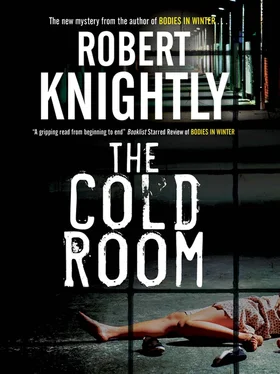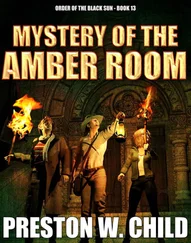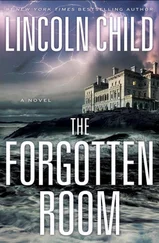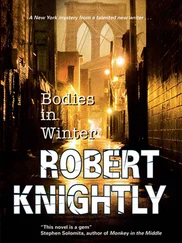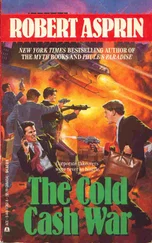Robert Knightly - The cold room
Здесь есть возможность читать онлайн «Robert Knightly - The cold room» весь текст электронной книги совершенно бесплатно (целиком полную версию без сокращений). В некоторых случаях можно слушать аудио, скачать через торрент в формате fb2 и присутствует краткое содержание. Жанр: Полицейский детектив, на английском языке. Описание произведения, (предисловие) а так же отзывы посетителей доступны на портале библиотеки ЛибКат.
- Название:The cold room
- Автор:
- Жанр:
- Год:неизвестен
- ISBN:нет данных
- Рейтинг книги:3 / 5. Голосов: 1
-
Избранное:Добавить в избранное
- Отзывы:
-
Ваша оценка:
- 60
- 1
- 2
- 3
- 4
- 5
The cold room: краткое содержание, описание и аннотация
Предлагаем к чтению аннотацию, описание, краткое содержание или предисловие (зависит от того, что написал сам автор книги «The cold room»). Если вы не нашли необходимую информацию о книге — напишите в комментариях, мы постараемся отыскать её.
The cold room — читать онлайн бесплатно полную книгу (весь текст) целиком
Ниже представлен текст книги, разбитый по страницам. Система сохранения места последней прочитанной страницы, позволяет с удобством читать онлайн бесплатно книгу «The cold room», без необходимости каждый раз заново искать на чём Вы остановились. Поставьте закладку, и сможете в любой момент перейти на страницу, на которой закончили чтение.
Интервал:
Закладка:
The obituary included Guillermo’s photograph. A man just approaching middle-age, he stood on the deck of a sleek, three-masted yacht, wearing shorts and sandals and a fisherman’s cap with a long brim that shaded his face. An Ernest Hemingway beard added a touch of bulk to his weak chin, while a broad smile revealed a set of horsey white teeth. Cradled against his chest, a brass trophy gleamed in the sunlight.
Aside from his support for the usual charities, yachting was Guillermo’s one claim to fame. In 1958, he’d won a race from New York to San Francisco that traced the route of the old clipper ships around Cape Horn. In 1963, he’d finished third in a competition that traced the route of Magellan across the Pacific. In 1974, his yacht had capsized in a squall thirty miles outside of Bermuda. All aboard were rescued after passing several harrowing hours in a life raft, but the vessel was lost.
Oddly, there was no mention of Guillermo’s business activities, leaving me to wonder if he’d inherited his money, if he’d lived the life of an aristocratic playboy. Guillermo had been married four times, the last to his personal assistant, Margaret Applewood of Bar Harbor, Maine, in 1984. He’d been fifty-nine on the day of the wedding, his blushing bride a mere twenty-four. Or maybe she wasn’t blushing; maybe she was just as bold as could be. Certainly there’d been no hiding the fact that she was pregnant. According to the date of birth on his driver’s license, Ronald Portola was born three months to the day after Guillermo put the ring on his mom’s finger.
According to his Times obituary, Guillermo Portola had died at home. Dying at home, especially if there’s no doctor present, raises all kinds of flags for criminal investigators, and so much the worse if the deceased was too feeble to resist an attack. Of course, Guillermo’s obituary hadn’t mentioned an investigation, but that possibility had reared its tantalizing head when the obituary also failed to mention the name of a funeral home, a memorial service, or the date of the funeral. Maybe the Portola family had instructed a crematorium to drop the old man’s ashes into the nearest dumpster, maybe they just wanted to be rid of him. And maybe his burial had been awaiting the outcome of an autopsy.
The New York Times prides itself on avoiding sleaze. If the ME had termed the death a homicide, the paper would have reported the facts, but the rumor mill was beneath its collective dignity. Not so the New York Post, a Murdoch-owned tabloid whose most complex stories begin and end on the same page. The Post runs on sleaze the way locomotives run on diesel fuel.
The New York Post did not disappoint. The paper’s first story, datelined May 17, 1998, six weeks after Guillermo’s passage, ran beneath the headline: ‘UNDETERMINED!’
What was undetermined was the cause of Guillermo’s death, which the ME had failed to pinpoint after an autopsy that included a tox screen. But there was no mention of the ME’s findings in a far more pertinent area, manner of death, which includes natural, homicide, suicide and accidental among its classifications. I knew from experience that individuals die for reasons that cannot be divined by even the most thorough autopsy, and that pathologists commonly rule the manner of death undetermined and the cause of death natural.
Nevertheless, my persistence did not go unrewarded. The story concluded with a description of Guillermo’s will, written a full year after his stroke. The estate was to be divided between his wife and two children, with Margaret receiving fifteen percent of the estimated forty million dollars in assets. The kiddies would split the rest, but not until they reached the age of forty. Until that time, the estate’s executor, Margaret Portola, would run their lives.
TWENTY-SEVEN
I spent Wednesday in Riverside Park with Sister Kassia, from a bit before nine until a bit after four. Far from the sweat-room I’d described the day before, the weather was delightful, the temperature in the mid-seventies, the breeze steady enough to lure a mini-fleet of sailboats onto the Hudson River.
Sister Kassia turned out to be a good companion. She didn’t complain as the hours dragged by, or when I treated her to a lunch of hot dogs and sodas. Instead, she questioned me closely about life on the job, her curiosity genuine.
I limited my responses to a few amusing anecdotes, including a story about a stoned burglar who’d been apprehended six blocks from the scene of the crime because he’d sat on a peanut butter sandwich, and another about an alcoholic cop fighter named Elvira Menendez. A legend in the Three-Four, Elvira had once been a professional wrestler in the Dominican Republic.
I told Sister Kassia my partner’s joke, too, the one about Ole asking God why he made Lena so dumb. She laughed even louder than Hansen.
When I turned the tables after lunch and a trip to the restroom, Sister Kassia was straightforward, even admitting that she had doubts about the whole business of illegal immigration. She didn’t believe that the United States could throw open its doors to anyone with a plane ticket, and she realized that illegal workers took jobs that would otherwise go to the poorest Americans. Worse still, from her point of view, she fully understood the extent to which she was acting as a shill for American corporations in search of cheap labor. But illegal immigrants, she insisted, were also human beings, human beings exploited on all sides, human beings in desperate need of aid. Helping them was an obligation imposed on her by the God she loved.
We finally caught a break at three thirty when the townhouse door opened and the Portolas’ maid emerged. Again she headed south, this time only to 80th Street where she turned east, toward Central Park. Sister Kassia and I set off in pursuit, but the small woman moved too quickly and we were still a hundred yards behind when she disappeared into a drug store on Broadway.
‘What do we do now?’ Sister Kassia asked.
‘Wait for her to come out.’
A few minutes later, she did exactly that, only to enter Zabar’s, an upscale market every bit as pricey as the Fairway Market to the south, and a lot more famous. If you’re fond of Namibian goat cheese at twenty bucks a pound, it’s the only place to shop.
‘This waiting business,’ Sister Kassia noted as we stood outside, ‘it wears thin pretty fast.’
‘Policing is a game of starts and stops. You’re always waiting for something, an autopsy, a ballistics report, a witness to surface. There’s no end to it.’
This time the wait was only a quarter of an hour; still too long, it seemed, for the little maid. She double-timed along 80th Street as if she’d just snatched a hundred-dollar bottle of grape-seed oil and Zabar’s security guards were on her tail. By the time I caught up and took her arm, she was halfway to West End Avenue.
‘Police,’ I said, displaying my badge, ‘I need to talk to you.’ She stared at my shield for a moment, through dark blue eyes, while the implications of my sudden appearance made themselves felt. Then her legs buckled as she dropped her parcels and I had to tighten my grip to keep her from falling. A second later, Sister Kassia chugged up, breathing hard. She said something to the girl in Polish and the girl managed to get her legs under her. Nevertheless, she was shivering with fear, her eyes as wild as those of a deer in a forest fire. Her chest had locked up as well, as if she couldn’t make up her mind whether to inhale or exhale. When she finally spoke, she spat her words out in short, choppy phrases.
The woman spoke directly to Sister Kassia, gripping the nun’s arm. I understood not a word of their conversation, but I didn’t interrupt. I knew about fear, of course, having seen it first hand, in the terrified eyes of battered women and battered children, in the eyes of rape victims in hospital examining rooms, in the eyes of the elderly after even a minor assault. Like grief, fear is an emotion cops try to avoid, but this woman was gripped by a terror so powerful that when Sister Kassia finally turned to me, I found it mirrored in her eyes.
Читать дальшеИнтервал:
Закладка:
Похожие книги на «The cold room»
Представляем Вашему вниманию похожие книги на «The cold room» списком для выбора. Мы отобрали схожую по названию и смыслу литературу в надежде предоставить читателям больше вариантов отыскать новые, интересные, ещё непрочитанные произведения.
Обсуждение, отзывы о книге «The cold room» и просто собственные мнения читателей. Оставьте ваши комментарии, напишите, что Вы думаете о произведении, его смысле или главных героях. Укажите что конкретно понравилось, а что нет, и почему Вы так считаете.
